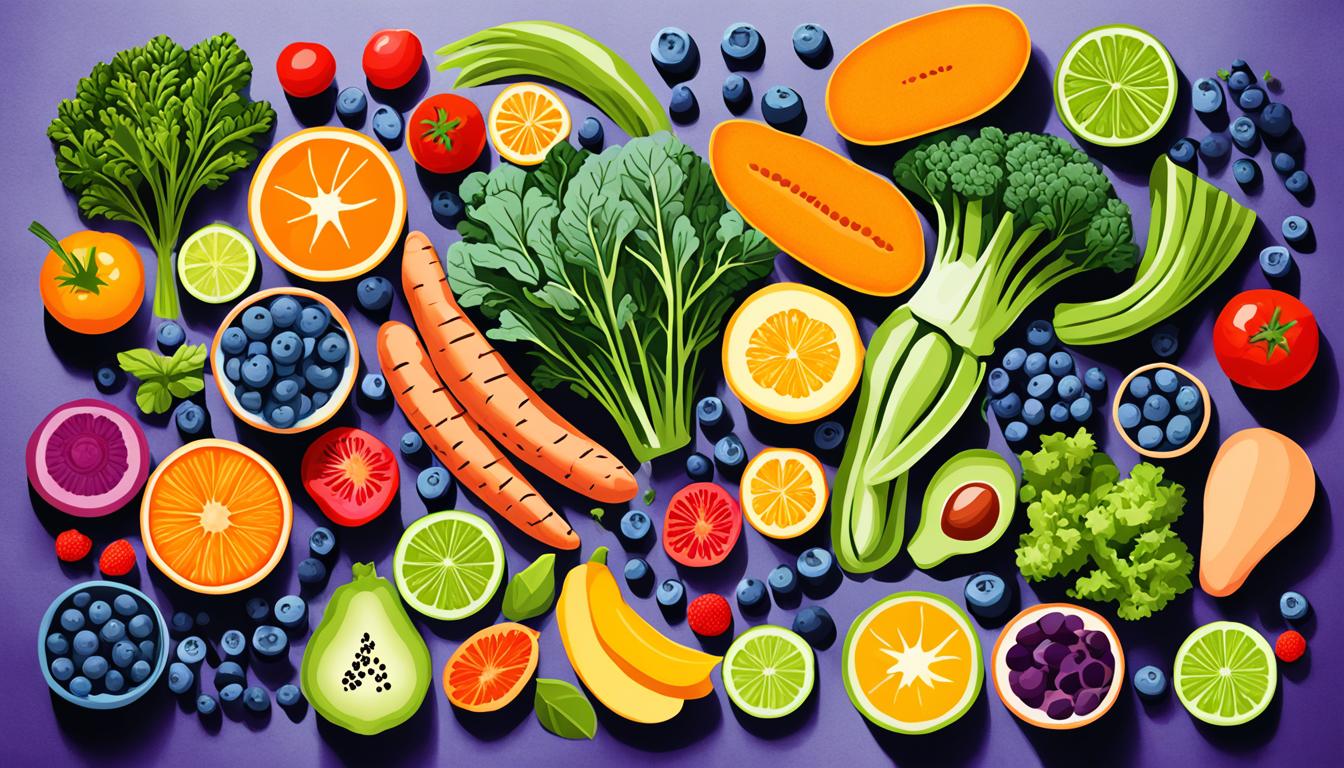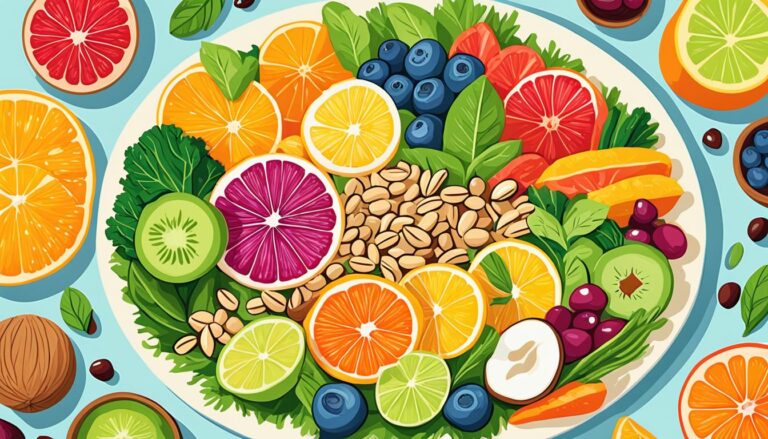Did you know that chronic inflammation is linked to numerous diseases such as heart disease, cancer, and diabetes? Inflammation is the body’s natural response to injury or infection, but when it becomes chronic, it can wreak havoc on your health. The good news is that there are foods you can incorporate into your diet to help reduce inflammation and improve your overall well-being.
Key Takeaways:
- Chronic inflammation is linked to various diseases and can have a negative impact on your health.
- By incorporating anti-inflammatory foods into your diet, you can help reduce inflammation and improve your overall well-being.
- Some of the top anti-inflammatory foods include berries, fatty fish, broccoli, and avocados.
- These foods are rich in antioxidants, vitamins, minerals, and compounds that have been shown to have anti-inflammatory effects.
- Including these foods in your diet can lower inflammatory markers in the body and reduce the risk of chronic diseases.
Berries – Nature’s Anti-Inflammatory Powerhouses
Berries are packed with fiber, vitamins, and minerals, making them a great addition to an anti-inflammatory diet. They contain antioxidants called anthocyanins, which have been shown to have anti-inflammatory effects and may reduce the risk of chronic diseases such as cancer. Additionally, research suggests that consuming berries can lower specific inflammatory markers associated with heart disease. Including a variety of berries like strawberries, blueberries, raspberries, and blackberries in your diet can provide powerful anti-inflammatory benefits.
| Berry | Antioxidant Content | Anti-Inflammatory Benefits |
|---|---|---|
| Strawberries | High | Reduces inflammation, may lower risk of heart disease |
| Blueberries | Very high | Decreases inflammation, may improve cognitive function |
| Raspberries | Moderate | Reduces inflammation, may lower risk of certain cancers |
| Blackberries | Moderate | Helps fight inflammation, may improve oral health |
With their vibrant colors and delicious taste, berries are a versatile ingredient that can be enjoyed in various ways. Add them to your morning oatmeal, smoothies, or salads for an extra anti-inflammatory boost. You can also enjoy them as a refreshing snack on their own or use them to create tasty desserts like berry parfaits or fruit salads.
By incorporating a variety of berries into your diet, you can harness nature’s anti-inflammatory powerhouses and support your overall health and well-being.
Fatty Fish – Omega-3 Powerhouses for Inflammation Reduction
Fatty fish, such as salmon, sardines, and mackerel, are not just tasty meal options but also offer powerful anti-inflammatory benefits. These fish are rich sources of omega-3 fatty acids, which have been extensively studied for their ability to reduce inflammation and lower the risk of chronic diseases associated with inflammation, such as heart disease, diabetes, and kidney disease.
Consuming fatty fish or taking omega-3 supplements has been found to significantly lower inflammatory markers like C-reactive protein (CRP) in the body, indicating a reduction in inflammation levels. Including fatty fish in your diet is a fantastic way to ensure you receive the essential omega-3 fatty acids needed to combat inflammation and promote overall health.

Not only are omega-3 fatty acids potent inflammation fighters, but they are also essential for various bodily functions like brain health, heart health, and maintaining healthy skin cells. By incorporating fatty fish into your meals regularly, you can enjoy the incredible benefits of omega-3s and significantly reduce the inflammation in your body.
The Cruciferous Power of Broccoli
Broccoli, along with other cruciferous vegetables like cauliflower, Brussels sprouts, and kale, is highly nutritious and has strong anti-inflammatory properties. It contains sulforaphane, an antioxidant that reduces inflammation by decreasing levels of cytokines and nuclear factor kappa B (NF-κB) in the body. These molecules are known to drive inflammation. Eating cruciferous vegetables, especially broccoli, has been linked to a decreased risk of heart disease and cancer due to their anti-inflammatory effects. Including broccoli in your diet can provide powerful anti-inflammatory benefits.
Here is a table showcasing the nutritional content of 100 grams of broccoli:
| Nutrient | Amount |
|---|---|
| Energy | 34 calories |
| Protein | 2.8 grams |
| Fat | 0.4 grams |
| Carbohydrates | 6.6 grams |
| Fiber | 2.6 grams |
| Vitamin C | 89.2 milligrams |
| Vitamin K | 101.6 micrograms |
| Folate | 63 micrograms |
| Potassium | 316 milligrams |
Broccoli is also a good source of vitamin A, vitamin B6, calcium, and iron, making it an excellent addition to an anti-inflammatory diet.

Avocado – The Creamy Anti-Inflammatory Superfood
Avocados are not only delicious but also incredibly nutritious and have anti-inflammatory properties. They are packed with potassium, magnesium, fiber, and heart-healthy monounsaturated fats. Avocados also contain carotenoids and tocopherols, which are linked to a reduced risk of cancer and heart disease. Additionally, a compound in avocados has been found to reduce inflammation in newly forming skin cells. Research suggests that consuming avocados can lower levels of specific inflammatory markers in the body. Adding avocados to your diet can provide a creamy and nutritious source of anti-inflammatory benefits.
To fully understand the anti-inflammatory benefits of avocados, let’s take a closer look at their nutritional profile:
| Nutrient | Amount per 100g |
|---|---|
| Potassium | 485mg |
| Magnesium | 29mg |
| Fiber | 6.7g |
| Monounsaturated fats | 9.8g |
| Carotenoids | 0.3mg |
| Tocopherols | 1.97mg |
These nutrients contribute to the overall health benefits of avocados and their ability to reduce inflammation in the body. Including avocados in your diet can be as simple as adding sliced avocado to salads, spreading avocado on whole grain toast, or blending it into a smoothie. Get creative and enjoy the creamy texture and delicious taste of avocados while reaping their anti-inflammatory benefits.
“Avocado is a versatile superfood that not only adds a creamy texture to meals but also provides a myriad of health benefits. Its anti-inflammatory properties make it an excellent addition to an anti-inflammatory diet.”
Conclusion
Incorporating anti-inflammatory foods into your diet can have a significant impact on reducing inflammation and improving overall wellness. By choosing the best foods to reduce inflammation, such as berries, fatty fish, broccoli, avocados, and other natural anti-inflammatory foods, you can lower inflammatory markers in your body and reduce the risk of chronic diseases.
Research shows that these inflammation-reducing foods are rich in antioxidants and anti-inflammatory compounds, which can help promote your overall health. By making dietary changes and embracing the power of these top anti-inflammatory foods, you can take control of your health and live a pain-free, vibrant life.
Remember, incorporating these natural anti-inflammatory foods into your diet is a powerful way to reduce inflammation through diet. By making these choices, you are nourishing your body with the nutrients it needs to combat inflammation and support optimal health. So, start making these delicious and nutritious choices today, and experience the benefits of a diet rich in anti-inflammatory foods!
You may also like our articles: Soothe Your Body: Best Anti-inflammatory Foods List and 5 Ways to Reduce Body Inflammation for more helpful tips on inflammation-reducing foods and ways to ease pain.






